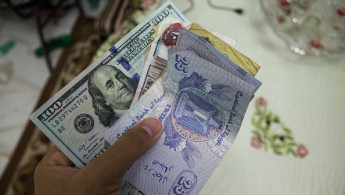Six years on, Egypt floats the pound once again
At the time when the Egyptian pound plunged around 17% in its value against the US dollar on Monday, following a rise in inflation amid growing economic hardships, the Central Bank of Egypt had announced higher interest rates at national banks.
State-run Banque Misr and the National Bank of Egypt declared, on the same day, they were offering one-year deposit certificates with an 18% yield, in what economists view as an attempt to collect more funds and curb inflation and, in turn, the sky-rocketing prices. Most Egyptian nationwide keep their savings in these two banks.
On the other hand, the pound has been trading at 18.25 to the dollar at banks on Tuesday, a significant rise from 15.70 on Sunday.
Undeclared flotation
Economics expert Hassan Heikal believes that "the recent measures taken by the government represent an unofficial declaration in floating the pound."
"It has been expected in view of the financial analyses given that the Egyptian pound was overvalued ahead of the US dollar," Heikal told The New Arab.
"The pound floated in 2016, but its value remained under the control of the central bank," he elaborated.
The recent measures are expected to have a grave impact on both imports and exports alike.
"About 60% of food products in Egypt are imported, while 75 of the production requirements in Egypt are also imported," Heikal said. "Foreign exporters will import Egyptian products as long the value Egyptian pound is low. But the local importer will decrease his imports as long as the US dollar’s value is high."
Heikal further explained that "in order for the exports to rise, there must be enough production available."
"On the other hand, we do not have an economic structure that allows local manufacturers to produce and export," he argued.
"As long as the country imports about 70% of its production requirements, the prices of local products will soar, leading to inflation and price hikes," he added.
Meanwhile, the finance ministry declared it would fix the value of the dollar for the imports of basic commodities at 16 pounds.
Over the past few weeks, the prices of imported goods, even locally produced goods, have soared.
A car trader, who preferred to remain anonymous fearing for his safety, told The New Arab that it had been very difficult to get dollars from currency exchange offices or banks, which led him to resort to the black market for a higher value to keep his business running and, in turn, he had to raise the prices vehicles.
A businessman, who also spoke to The New Arab on condition of anonymity, said that he used to own currency exchanges offices across the country that had been shut down by the authorities some time ago, leading him to lay off 120 employees.
The source added that it had come to his knowledge, off the record, that only state-own banks would be tasked with foreign exchanges in the near future. However, he declined to give further details.
History repeats itself
Egyptians, especially the poor and the middle-classes, have still not yet recovered from the repercussions of a previous floatation of the pound back in 2016. The floating of the pound was stipulated by the International Monetary Fund (IMF) after granting Egypt loans worth billions of US dollars.
"In order to maintain the living standards of the people and limit poverty, their income has to be in proportion with the rising prices," Heikal said.
In 2016, the inflation rate in Egypt reached 34 per cent, leading to increasing poverty among Egyptians, and as the economist argument meant that "Egyptians paid the bill of the economic reform plan."
On his part, a civil servant, who earns only 2,500 Egyptian pounds a month (about $135) supports his wife and two children. He has no clue how to survive anymore.
"We have been living in a dire state, missing any kind of luxury in our life. After the floating of the six years ago, any salary raises never compensated for rising prices," he told The New Arab, also on condition of anonymity, fearing for his security.
"The president has also recently limited free and subsidised food rations to cover only two family members. This is totally unfair. We are four humans living under the same roof," the civil servant bitterly added.
Social media users were quick to react to the recent updates, promoting the an Arabic hashtag that roughly translates to "the coming days."
One tweeted: "May God help all the poor and the weak in the coming days and help them manage life and its ordeals so they don’t resort to human beings."
|
Another social media user called for mass protests and tweeted: "We are heading to the streets on Friday. A revolution, a revolution till we prevail, on all streets of Egypt," adding the hashtag 'the revolution of the poor,' and 'Leave, Sisi'.
|




 Follow the Middle East's top stories in English at The New Arab on Google News
Follow the Middle East's top stories in English at The New Arab on Google News

![A group of Palestinians, foreign and Israeli activists gather to participated in an olive picking event on the land in the town of Battir, which is under threat of confiscation by Israel in Bethlehem, occupied West Bank on 8 November 2024. [Getty]](/sites/default/files/styles/image_330x185/public/2182930803.jpeg?h=199d8c1f&itok=__0LgGsa)
